How much sleep do you need?
Getting enough sleep is essential for maintaining good health and overall well-being.
The sleep duration recommended by the National Sleep Foundation [1] is 7 to 9 hours for young adults to adults.
However, it's important to note that sleep needs can vary for each age group and individual. 👨👩👧👦
For example, teenagers need more sleep, while older adults need less.
Take a look at our guide on the recommended hours of sleep by age:
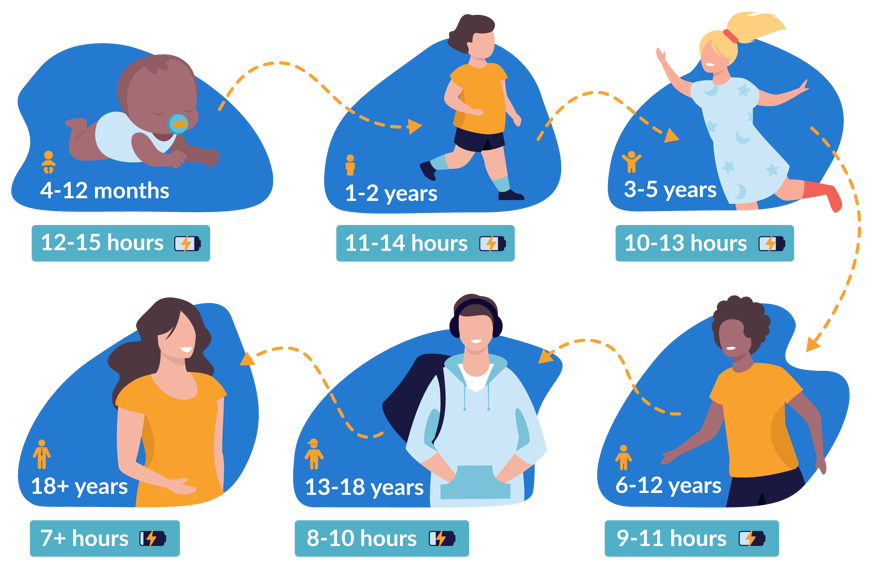
As we age, our need for sleep decreases. 👵
While newborns may require up to 17 hours of sleep daily, older adults only need roughly 8 hours.
This is because our bodies become less efficient at repairing and regenerating cells as we age, requiring less sleep to perform these functions.
You should pay attention to your body and ensure you get enough sleep to feel rested and rejuvenated. 🧘
If you experience daytime sleepiness [2], this is a sign that you’re not getting enough sleep.
Maybe you want to wake up early but don't know how? We will explain everything important to you in our review.
Is 6 hours of sleep enough to feel rested?
Sleep is essential for good health, but those with demanding lifestyles may need help to get enough rest. ⏰
We spend a third of our lives sleeping, which can feel like wasted time.
Getting by on less sleep leaves more time for work, socialising, and other activities.
However, the downsides of sleeping less than the recommended amount can be significant. 👎
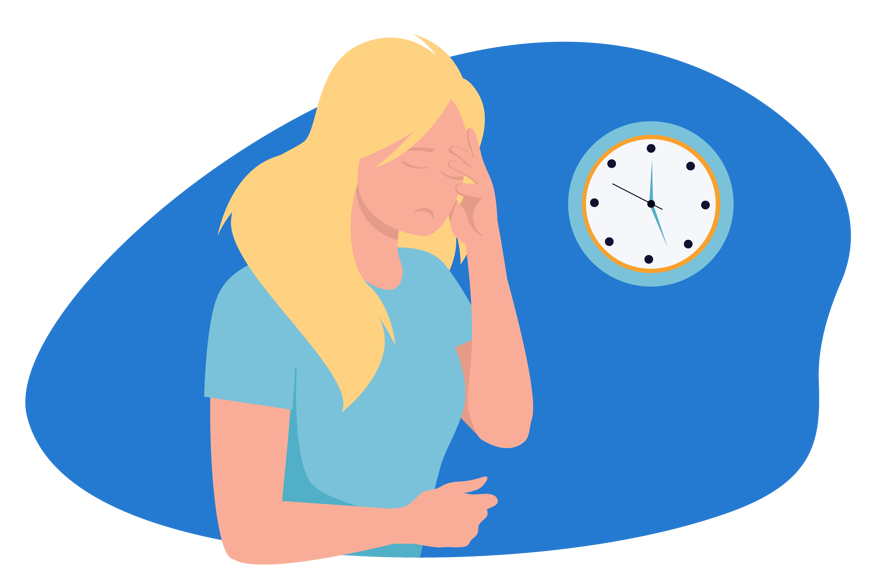
Less than 6 hours of sleep per night can cause daytime sleepiness, negatively affecting work quality and social interactions. 😔
It can also weaken the immune system, increase the risk of chronic health conditions, and contribute to negative moods, including anxiety and depression.
Consistently getting too little sleep may even slow down healing if you have an injury (like broken ribs or muscle strain).
Despite the risks, chronic sleep deprivation is prevalent in modern society, with 1 in 8 Brits [3] getting under 6 hours of sleep every night. 💤
Six hours of sleep is not enough for the overwhelming majority of us. I meet too many people in my work who allocate insufficient time for sleep (e.g., staying up late on social media, etc., and/or getting up early to go to the gym). A few people even ask how they might sleep less but to try to help with that would be irresponsible. You owe it to yourself and your long-term health to get enough sleep and you owe it to others (e.g., when you are driving) to ensure that you are properly rested.
Andrew Green
Sleep Therapist
It is essential to prioritise sleep as part of a healthy lifestyle and seek support if struggling to get adequate rest.
But what if you do need less sleep than others?
In some rare cases, 6 hours of sleep is enough to feel rested. 🤯
Scientists at University of California, San Francisco [4] found a "short sleep gene" associated with being a naturally short sleeper!
Their experiments found this mutant gene makes you feel more awake, leading to shorter snooze time.

And guess what?
These natural short-sleepers don't suffer the usual sleep deprivation problems and experience better sleep quality and efficiency overall.✔️
Nevertheless, it's crucial to remember that this gene is present in less than 3% of the population, and most of us still require the usual 7 - 9 hours of sleep to feel fully refreshed.
What causes sleep deprivation?
Sleep deprivation [5] is common when individuals don't get enough sleep, either in quantity or quality.
Our bodies run on a 24-hour internal clock, known as a circadian rhythm [6], which benefits from consistent and healthy sleep habits.
Melatonin [7] in our body rises at night, helping us fall asleep more easily. 😴
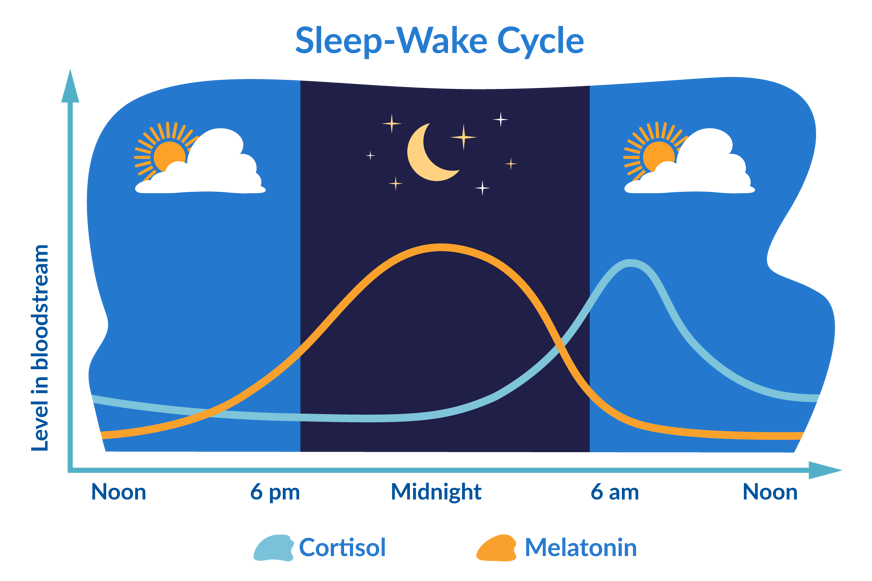
But disruptions to our sleep patterns can interrupt our circadian rhythm and lead to sleep deprivation.
Many factors can cause sleep deprivation:
- Stress and other mental health issues like anxiety or depression
- An unsuitable mattress or pillow that decreases the quality of your sleep
- Medical conditions such as sleep apnoea, insomnia, and narcolepsy
- Environmental factors like noise and light
- Lifestyle choices such as excessive caffeine intake or screen time before bed (which can inhibit melatonin release)
Identifying the underlying cause of sleep deprivation is essential to address the issue and prevent long-term health consequences. 🤒
If you have difficulty waking up when your alarm sounds, if you feel sleepy during the day, or if you take extra sleep at weekends, you are probably getting insufficient sleep. You cannot ordinarily sleep too much and should ensure that you allow time for enough sleep.
Andrew Green
Sleep Therapist
If you think you are suffering from sleep deprivation, you can try our tips on improving your overall sleep routine.
What are the consequences of sleeping for 6 hours or less each night?
Sleep deprivation can have severe consequences for our physical and mental health. 😢
Matthew Walker, a professor of neuroscience, explains in his book Why We Sleep how sleep deprivation can quickly impair our cognitive skills and overall performance.
In one of his studies, Walker observed subjects and compared the effects of getting just 6 hours of sleep:
Ten days of six hours of sleep a night was all it took to become as impaired in performance as going without sleep for twenty-four hours straight. And like the total sleep deprivation group, the accruing performance impairment in the four-hour and six-hour sleep groups showed no signs of levelling out. All signs suggest that if the experiment had continued, the performance deterioration would continue to build up over weeks or months.

Matthew Walker
Why We Sleep
The group that got 6 hours of sleep or less per night showed no signs of improvement, and performance continued to deteriorate over time.
However, subjects that slept for 8 hours “retained a stable and near-perfect performance across the two weeks.”
Chronic sleep deprivation can have severe long-term effects [8] like high blood pressure, obesity, and cardiovascular problems like heart disease. 💔
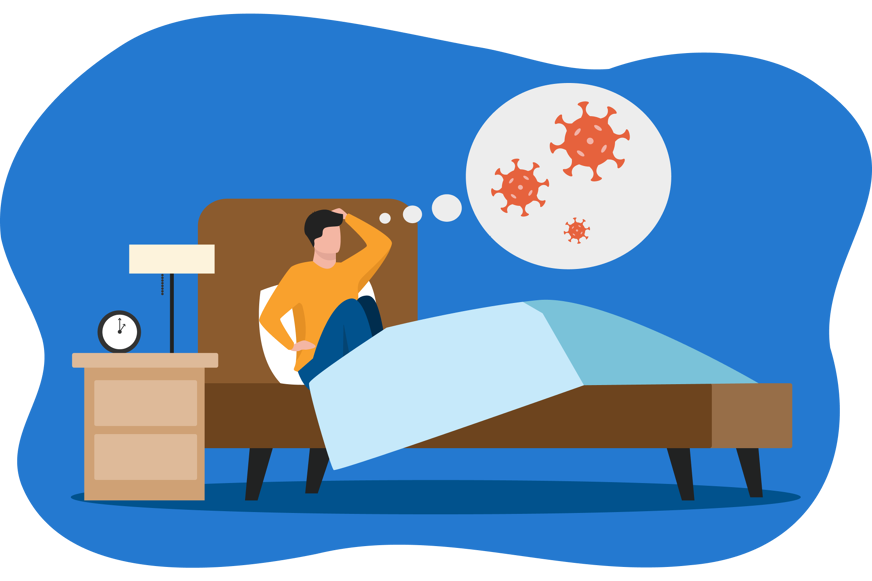
But it's also important to understand the difference between sleep quality and quantity. 👇
Why sleep quality is more important than quantity
Did you know that getting a solid 8 to 10 hours of "sleep" doesn't always guarantee a restful night? 😴
Many people mistakenly count time spent in bed as actual sleep, but poor sleep quality can still leave you feeling groggy and unrested.
Studies [9] show that getting better quality sleep is actually more beneficial to our sleep health than getting more hours of sleep.
So, how can you tell if your sleep quality is suffering?
Ask yourself the following questions:
- Does it take you more than 30 minutes to fall asleep?
- Do you wake up multiple times throughout the night?
- If you wake up during the night, do you find it difficult to fall back to sleep?
- Do you wake up tired and have difficulty concentrating during the day?
If you answered yes to any of these questions, this could be a sign you are not getting enough sleep or experiencing low sleep quality. 😴
Factors like poor sleep hygiene, stress and anxiety, or undiagnosed sleep disorders can all contribute to poor sleep quality.
We've got some tips in the next section on how to improve your sleep quality. 👇
How to deal with sleep deprivation
If you're struggling with sleep deprivation, there are several strategies you can use to improve the quality and duration of your sleep.
Try the following methods:
- Create a comfortable sleep environment: Keep your bedroom cool, dark, and quiet with comfortable bedding and pillows.
- Stick to a regular sleep schedule: Practicing good sleep hygiene and establishing a sleep routine will make it easier to fall asleep and wake up naturally.
- Avoid caffeine and alcohol: Both can disrupt sleep, making falling asleep or getting quality rest harder.
- Try relaxation techniques: Meditation, deep breathing and bathing before bed can help calm your mind and body before bedtime, promoting better sleep quality.
- Reduce screen time: Set aside time for relaxation before bed, avoid electronic devices emitting blue light, and develop a bedtime routine to signal your body that it's time to sleep.
However, these practices may not be enough for a more serious problem. 🤔
If sleep deprivation affects your daily lifestyle or you think you may suffer from a sleep disorder, you should seek advice from a qualified medical professional.
So, is 6 hours of sleep enough?
Getting enough sleep is essential for maintaining good physical and mental health, and you should aim for the recommended 7 to 9 hours per night.
While sleeping only 6 hours per night may leave more time for work, socialising, and other activities, the impact of sleeping less can be detrimental.
Chronic sleep deprivation can impact cognitive function, weaken the immune system, and increase the risk of chronic health conditions.
If you’re struggling with sleep, ensure you have a comfortable pillow and mattress, stick to a consistent sleep schedule, and avoid caffeine and alcohol before bed.
It is essential to prioritise sleep as part of a healthy lifestyle and seek support if struggling to get adequate rest.









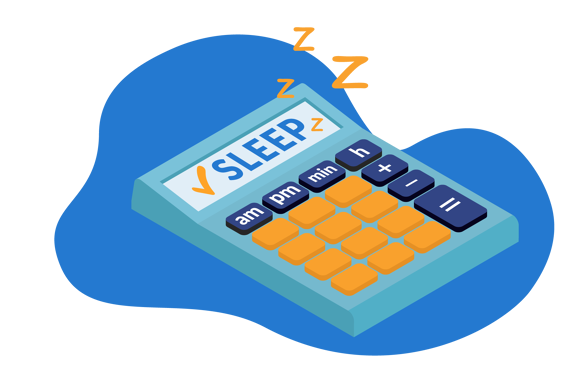
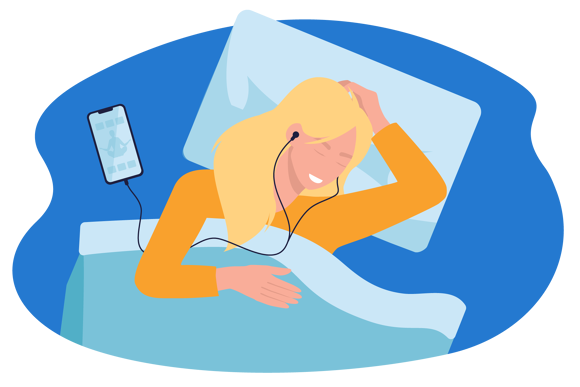
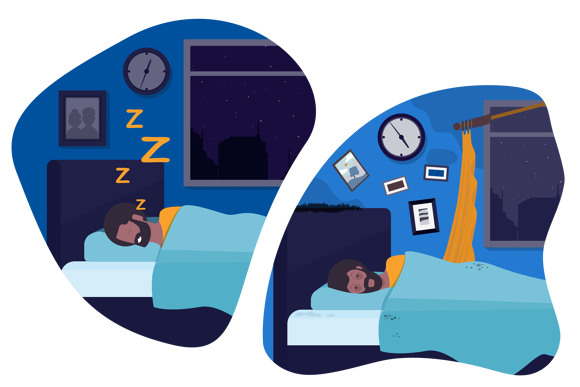


Alternatively, message us directly via the Contact Us page.